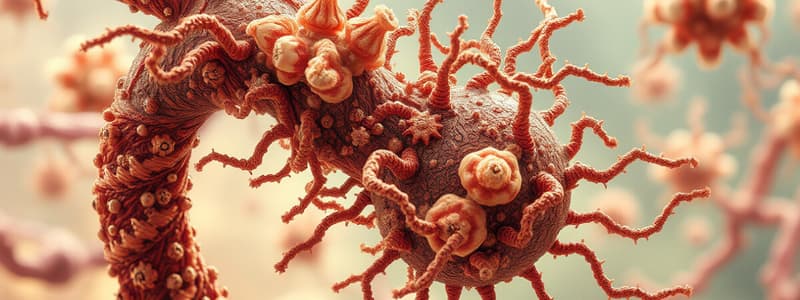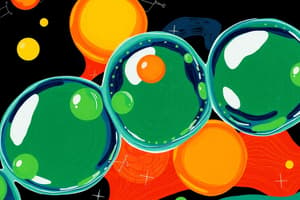Podcast
Questions and Answers
Which sterol is commonly found in animals and protozoa?
Which sterol is commonly found in animals and protozoa?
What type of infectious agent is made only of proteins?
What type of infectious agent is made only of proteins?
Which antifungal therapy inhibits ergosterol synthesis?
Which antifungal therapy inhibits ergosterol synthesis?
Which infectious agent is characterized by the absence of nucleic acids?
Which infectious agent is characterized by the absence of nucleic acids?
What key role does ergosterol play in fungi?
What key role does ergosterol play in fungi?
What is the primary component of prions?
What is the primary component of prions?
Amphotericin targets which aspect of fungal cells?
Amphotericin targets which aspect of fungal cells?
Which of the following is characteristic of ergosterol?
Which of the following is characteristic of ergosterol?
Which toxin inactivates the 60S ribosome and is associated with Vero toxin?
Which toxin inactivates the 60S ribosome and is associated with Vero toxin?
Which of the following toxins is produced by Bacillus anthracis?
Which of the following toxins is produced by Bacillus anthracis?
What is the effect of the cholera toxin on adenylate cyclase?
What is the effect of the cholera toxin on adenylate cyclase?
Which toxin is known to mimic adenylate cyclase activity?
Which toxin is known to mimic adenylate cyclase activity?
Which toxin is associated with the bacteria Enterotoxigenic E. coli?
Which toxin is associated with the bacteria Enterotoxigenic E. coli?
What are the two methods of transposition for transposable elements?
What are the two methods of transposition for transposable elements?
Which of the following best describes ‘jumping genes’?
Which of the following best describes ‘jumping genes’?
What is a significant feature of prions?
What is a significant feature of prions?
Which clinical manifestation is associated with higher cortical dysfunction and dementia?
Which clinical manifestation is associated with higher cortical dysfunction and dementia?
What is the etiology of variant CJD associated with?
What is the etiology of variant CJD associated with?
Which of the following diseases is associated with cannibalism?
Which of the following diseases is associated with cannibalism?
Which of the following enzymes do transposable elements code for?
Which of the following enzymes do transposable elements code for?
What type of transposition involves replicating the DNA segment before moving it?
What type of transposition involves replicating the DNA segment before moving it?
Which of the following describes a potential consequence of prion infections?
Which of the following describes a potential consequence of prion infections?
Which of the following is NOT a symptom of cerebellar manifestations?
Which of the following is NOT a symptom of cerebellar manifestations?
What is the primary action recommended for healthcare workers for day-to-day hand decontamination?
What is the primary action recommended for healthcare workers for day-to-day hand decontamination?
When should handwashing with soap and water be employed?
When should handwashing with soap and water be employed?
Which organism is NOT effectively targeted by alcohol-based hand sanitizers?
Which organism is NOT effectively targeted by alcohol-based hand sanitizers?
What should be done after using the toilet in terms of hand hygiene?
What should be done after using the toilet in terms of hand hygiene?
What type of pathogens require special attention during outbreaks of diarrhea?
What type of pathogens require special attention during outbreaks of diarrhea?
Which is a characteristic feature of plasmids?
Which is a characteristic feature of plasmids?
Which of the following is a context in which handwashing is emphasized?
Which of the following is a context in which handwashing is emphasized?
Alcohol-based hand sanitizers are effective against which of the following?
Alcohol-based hand sanitizers are effective against which of the following?
What is the suggested action when exposure to potential spore-forming pathogens is suspected?
What is the suggested action when exposure to potential spore-forming pathogens is suspected?
What should healthcare workers do routinely to ensure hand hygiene?
What should healthcare workers do routinely to ensure hand hygiene?
Which type of bacteria are primarily associated with exotoxin production?
Which type of bacteria are primarily associated with exotoxin production?
What is a key difference in the secretion of exotoxins compared to endotoxins?
What is a key difference in the secretion of exotoxins compared to endotoxins?
Which of the following oxygen requirements corresponds to obligate anaerobes?
Which of the following oxygen requirements corresponds to obligate anaerobes?
Which type of bacteria has a low fatal dose associated with its endotoxin?
Which type of bacteria has a low fatal dose associated with its endotoxin?
Which statement correctly describes the antigenicity of exotoxins?
Which statement correctly describes the antigenicity of exotoxins?
Which type of toxin is destroyed at 60°C and the reason why vaccines cannot be formed from it?
Which type of toxin is destroyed at 60°C and the reason why vaccines cannot be formed from it?
Which of the following has the highest toxicity based on the information provided?
Which of the following has the highest toxicity based on the information provided?
Which of the following is a characteristic of endotoxins?
Which of the following is a characteristic of endotoxins?
Which type of bacteria includes those that can use fermentation but tolerate low levels of oxygen?
Which type of bacteria includes those that can use fermentation but tolerate low levels of oxygen?
Where are the genes for exotoxins typically located?
Where are the genes for exotoxins typically located?
Flashcards are hidden until you start studying
Study Notes
Sterols in Different Organisms
- Protozoa and Animals: Contain cholesterol.
- Fungi: Contain ergosterol, a target for antifungal therapy.
- Pegylated Antifungal Agents:
- Ketoconazole inhibits ergosterol synthesis.
- Amphotericin directly targets membrane sterols.
Infectious Agents Lacking Nucleic Acids
- Prions: Composed solely of proteins (PRoteIns Only).
- Other infectious agents like viruses, bacteria, and viroids contain nucleic acids.
Transposable Elements
- Definition: "Jumping genes" that move within or between DNA in various life forms.
- Roles: Encode drug-resistant enzymes, toxins, or metabolic functions.
- Types of Transposition:
- Cut-and-Paste (direct transposition)
- Copy-and-Paste (replicative transposition).
Prions and Associated Diseases
- Disease Examples:
- Sporadic and Variant Creutzfeldt-Jakob disease (CJD) linked to various transmission methods—variant CJD notably associated with BSE in bovines.
- Diagnosis: Histopathology reveals symptoms like ataxia, myoclonic jerks, and higher cortical dysfunction.
Hand Hygiene Practices
- Recommended Actions: Hand rubbing for decontamination; handwashing with soap and water when visibly contaminated or during outbreaks of spore-forming pathogens.
- Alcohol-based Hand Sanitizers: Ineffective against Clostridium difficile.
Plasmids
- Definition: Extrachromosomal, double-stranded, circular DNA independent of chromosomal DNA.
Toxin Types
- Exotoxins:
- Found in certain gram-positive and gram-negative bacteria.
- Secreted from the cell and highly toxic (fatal dose ~1 microgram).
- Endotoxins:
- Found in the outer cell membrane of most gram-negative bacteria.
- Composed of Lipid A and released upon cell lysis; less toxic.
Oxygen Requirement of Bacteria
- Obligate Aerobes: Require oxygen for ATP generation.
- Microaerophiles: Can tolerate low oxygen concentrations.
- Facultative Anaerobes: Prefer oxygen but can ferment in its absence.
- Aerotolerant Anaerobes: Anaerobic but indifferent to oxygen presence.
- Obligate Anaerobes: Cannot survive in oxygen due to lacking critical enzymes (SOD, peroxidase, catalase).
Clinical Effects of Endotoxins
- Response: Induced fever, shock, disseminated intravascular coagulation (DIC).
- Antigenicity: Often poorly antigenic with no effective vaccines available.
Examples of Specific Toxins
- Vero Toxin (Shiga-like): Inactivates 60S ribosome, found in bacterial chromosome or phage.
- Cholera Toxin: Increases adenylate cyclase activity, associated with Vibrio cholerae.
- Heat Labile Toxin: Found in Enterotoxigenic E. coli, activates adenylate cyclase activity.
- Anthrax Toxin: Increases cAMP levels, linked to Bacillus anthracis.
- Pertussis Toxin: Mimics adenylate cyclase action, related to Bordetella pertussis.
Studying That Suits You
Use AI to generate personalized quizzes and flashcards to suit your learning preferences.





